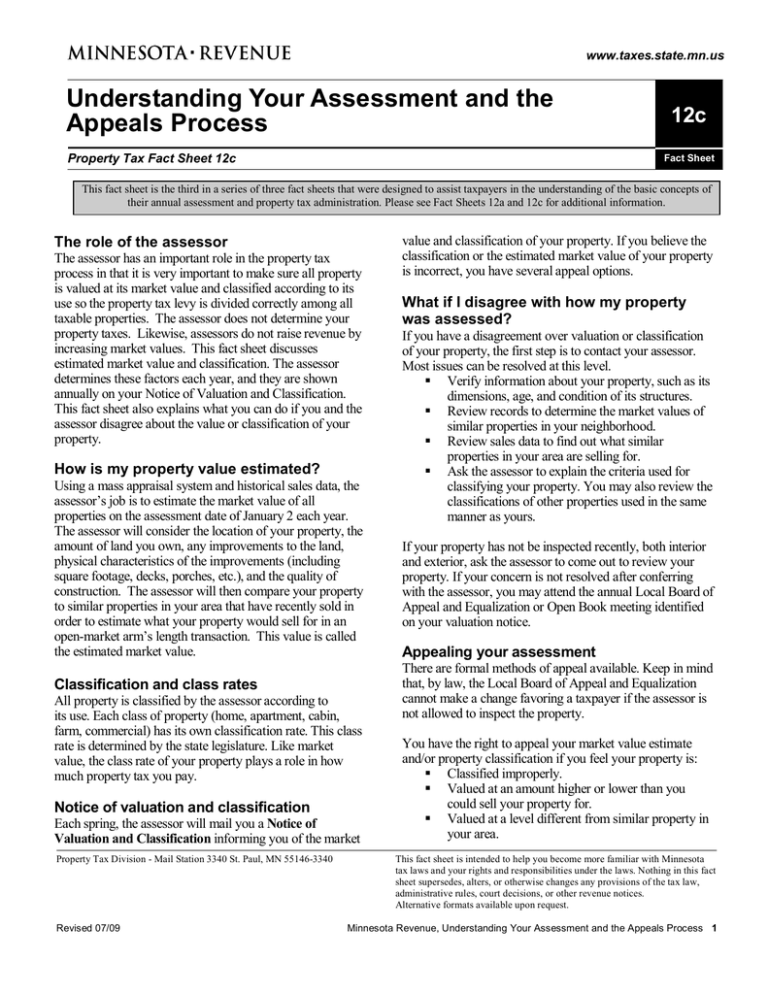Property Tax Fact Sheet 12c, Understanding Your Assessment and
advertisement

www.taxes.state.mn.us Understanding Your Assessment and the Appeals Process Property Tax Fact Sheet 12c 12c Fact Sheet This fact sheet is the third in a series of three fact sheets that were designed to assist taxpayers in the understanding of the basic concepts of their annual assessment and property tax administration. Please see Fact Sheets 12a and 12c for additional information. The role of the assessor The assessor has an important role in the property tax process in that it is very important to make sure all property is valued at its market value and classified according to its use so the property tax levy is divided correctly among all taxable properties. The assessor does not determine your property taxes. Likewise, assessors do not raise revenue by increasing market values. This fact sheet discusses estimated market value and classification. The assessor determines these factors each year, and they are shown annually on your Notice of Valuation and Classification. This fact sheet also explains what you can do if you and the assessor disagree about the value or classification of your property. How is my property value estimated? Using a mass appraisal system and historical sales data, the assessor’s job is to estimate the market value of all properties on the assessment date of January 2 each year. The assessor will consider the location of your property, the amount of land you own, any improvements to the land, physical characteristics of the improvements (including square footage, decks, porches, etc.), and the quality of construction. The assessor will then compare your property to similar properties in your area that have recently sold in order to estimate what your property would sell for in an open-market arm’s length transaction. This value is called the estimated market value. Classification and class rates All property is classified by the assessor according to its use. Each class of property (home, apartment, cabin, farm, commercial) has its own classification rate. This class rate is determined by the state legislature. Like market value, the class rate of your property plays a role in how much property tax you pay. Notice of valuation and classification Each spring, the assessor will mail you a Notice of Valuation and Classification informing you of the market Property Tax Division - Mail Station 3340 St. Paul, MN 55146-3340 Revised 07/09 value and classification of your property. If you believe the classification or the estimated market value of your property is incorrect, you have several appeal options. What if I disagree with how my property was assessed? If you have a disagreement over valuation or classification of your property, the first step is to contact your assessor. Most issues can be resolved at this level. Verify information about your property, such as its dimensions, age, and condition of its structures. Review records to determine the market values of similar properties in your neighborhood. Review sales data to find out what similar properties in your area are selling for. Ask the assessor to explain the criteria used for classifying your property. You may also review the classifications of other properties used in the same manner as yours. If your property has not be inspected recently, both interior and exterior, ask the assessor to come out to review your property. If your concern is not resolved after conferring with the assessor, you may attend the annual Local Board of Appeal and Equalization or Open Book meeting identified on your valuation notice. Appealing your assessment There are formal methods of appeal available. Keep in mind that, by law, the Local Board of Appeal and Equalization cannot make a change favoring a taxpayer if the assessor is not allowed to inspect the property. You have the right to appeal your market value estimate and/or property classification if you feel your property is: Classified improperly. Valued at an amount higher or lower than you could sell your property for. Valued at a level different from similar property in your area. This fact sheet is intended to help you become more familiar with Minnesota tax laws and your rights and responsibilities under the laws. Nothing in this fact sheet supersedes, alters, or otherwise changes any provisions of the tax law, administrative rules, court decisions, or other revenue notices. Alternative formats available upon request. Minnesota Revenue, Understanding Your Assessment and the Appeals Process 1 Remember, your assessor is not responsible for the dollar amount of taxes that you pay. Tax rates are determined by your local taxing authorities (the city, the county, school, districts, etc.). If you think your taxes are too high, you should make your opinion known to your taxing authorities during the budget meetings in November and December. Minnesota Tax Court You have until April 30 of the year the tax becomes payable to appeal your assessment to the Minnesota Tax Court. In other words, you must appeal your 2009 valuation and classification on or before April 30, 2010. The Tax Court has two divisions: The Small Claims Division and the Regular Division. Local Board of Appeal and Equalization If you choose to appeal to your boards of appeal and equalization, first must first meet with your Local (city or town) Board of Appeal and Equalization. These are often the same people as your city council or town board. The board meets on a specified day in April or May. The exact date is listed on your Notice of Valuation and Classification. We strongly recommend that you contact your city or town clerk to schedule your appearance. Some jurisdictions hold an open book meeting instead of a Local Board of Appeal and Equalization. Please check your Notice of Valuation and Classification for date, time, and place. You may make your appeal in person, by letter, or have someone else appear for you. The assessor will be present to answer questions. You must present your case to the city or town board before going to the County Board of Appeal and Equalization. Cities and towns have the option of transferring their board powers to the County Board of Appeal and Equalization. If your municipality has elected to do this, your Notice of Valuation and Classification will direct you where to begin your appeal. County Board of Appeal and Equalization If you are not satisfied after your Local Board of Appeal and Equalization or open book meeting, or if your city or town has transferred its powers to the county, you may appeal to the County Board of Appeal and Equalization. The Small Claims Division only hears appeals involving one of the following situations: The assessor’s estimated market value of your property is less than $300,000. Your entire parcel is classified as a residential homestead (1a or 1b) and the parcel contains no more than one dwelling unit. Your entire property is classified as an agricultural homestead. You’re appealing the denial of a current year application for homestead classification of your property. The proceedings of the Small Claims Division are less formal and many people represent themselves. Decisions made by the small claims division are final and cannot be appealed further. The Regular Division will hear all appeals – including those within the jurisdiction of the small claims division. Decisions made here can be appealed to a higher court. Most people who appeal to the regular division hire an attorney because the hearing is conducted according to the Minnesota Rules of Civil Procedure. You may obtain complete information on Tax Court appeals by writing or calling the court administrator in your county or by contacting: This board meets in June. The exact date is listed on your Notice of Valuation and Classification. The members are usually the county board of commissioners or their appointees. We strongly recommend that you contact your county auditor or assessor to schedule your appearance before the board. Many counties request that taxpayers make appointments to appear. Minnesota Tax Court Minnesota Judicial Center Suite 245 25 Reverend Dr. Martin Luther King, Jr. Boulevard St. Paul, MN 55115 (651) 296-2806 www.taxcourt.state.mn.us You may make your appeal in person, by letter, or have someone else appear for you. The assessor will be present to answer questions. If you are not satisfied with the decision of the County Board of Appeal and Equalization, you may appeal to the Minnesota Tax Court. Conclusion In conclusion, it is essential that taxpayers understand that assessors use historical sales data to estimate a property’s market value. This estimate may be appealed informally by speaking with the assessor or formally by appearing at the Local or County Boards of Appeal and Equalization. For additional information, please refer to Fact Sheet 12a Understanding Property Taxes and Fact Sheet 12b How the Assessor Estimates Your Market Value Minnesota Revenue, Understanding Your Assessment and the Appeals Process 2

